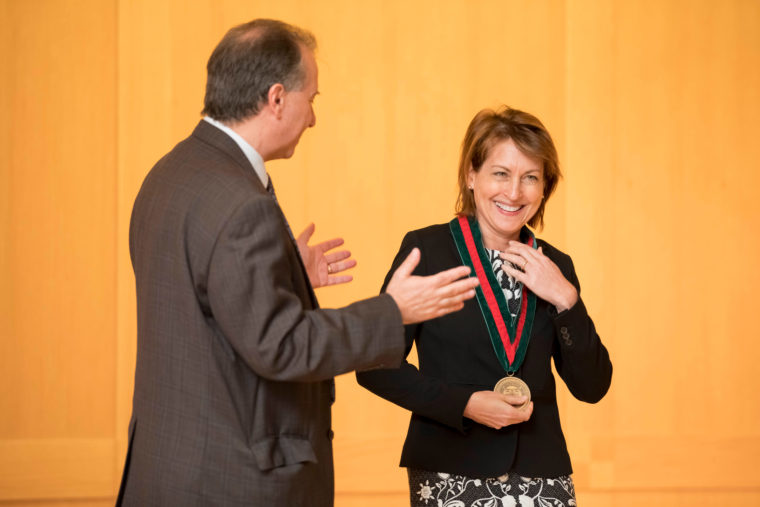Lori Setton, a renowned researcher into the role of the degeneration and repair of the body’s soft tissues, has been named the Lucy and Stanley Lopata Distinguished Professor of Biomedical Engineering at Washington University in St. Louis. She was installed Oct. 24 in a ceremony at Whitaker Hall.
Setton joined the School of Engineering & Applied Science faculty in 2015 from Duke University. Her research uses tools from mechanical engineering, materials synthesis and cell and molecular biology to advance use of drug depots, or those injected in a local mass from which it is gradually absorbed by surrounding tissue, and biomaterials as therapies for musculoskeletal diseases.
The professorship was established in 1996 through the generosity of the late Stanley and Lucy Lopata.
“Few names are as recognizable across the Danforth Campus as that of Stanley and Lucy Lopata,” said Chancellor Mark S. Wrighton. “For decades, they provided generously in support of faculty, students, and facilities at Washington University. I am so pleased that their names will now be associated with the important work of Professor Lori Setton.”
“Lori Setton is the perfect example of an engineer who can tackle a problem using tools from multiple disciplines of engineering,” said Aaron F. Bobick, dean of the School of Engineering & Applied Science and the James M. McKelvey Professor. “She expertly blends her vast knowledge in mechanics, materials and cell biology to develop biomaterials that could be used in the treatment of painful musculoskeletal conditions, such as herniated disks or arthritis. We are grateful for the Lopatas’ generosity to Engineering at Washington University that continues their legacy.”
Setton’s work includes creating new biomaterials for controlling the characteristics and metabolism of intervertebral discs; creating new drug depots to slowly release inflammatory inhibitors in arthritis and disc diseases; studying cell-cell and cell-matrix interactions that regulate intervertebral disc and progenitor cell phenotypes; and creating preclinical models of arthritis and intervertebral disc disorders and novel assessments of pain and dysfunction.
Setton earned master’s and doctoral degrees, both in mechanical engineering and biomechanics, respectively, from Columbia University. She earned a bachelor’s degree in mechanical and aerospace engineering from Princeton University. She is a fellow of the Biomedical Engineering Society and of the American Institute of Biological and Medical Engineering and earned a Presidential Early Career Award from Scientists and Engineers (PECASE) in 1997, as well as several awards for excellence in mentoring.
Stanley and Lucy Lopata were significant benefactors of Washington University for much of their lives. In addition to two professorships in Engineering, they supported buildings, including Lopata Hall in Engineering, outdoor courtyards at the Olin Business School and the Brown School as well as Lucy and Stanley Lopata House in The Village housing community; scholarships and the annual Lopata Classic invitational basketball tournament each fall, for which they were inducted into the university’s Sports Hall of Fame in 1992.
Stanley Lopata graduated in 1935 with a degree in chemistry in Arts & Sciences. As a “sideline,” in 1946 he began manufacturing chemical products, which grew into the multimillion-dollar enterprise, Carboline Co. After selling Carboline in 1980 to Sun Oil Refining and Marketing Co., he established another successful business, Lopata Research and Development. He also was a longtime trustee of the university and died in 2000.
Lucy Lopata was born in Germany and attended school in Switzerland before immigrating to the U.S. in 1934. She was actively involved with many St. Louis organizations, including the Miriam Foundation, MERS Goodwill, Missouri Botanical Garden, Opera Theatre of Saint Louis and Repertory Theatre of St. Louis. She received the St. Louis Globe-Democrat’s Women of Achievement Award in 1969 and the Jewish Federation of St. Louis’ Shining Star award in 1995. She died in 2013.
Stanley and Lucy Lopata received numerous awards over the years, including honorary degrees, in 1993 and 2001, respectively, as well as the Robert S. Brookings Award, presented by the Board of Trustees for exemplary work in bridging the University and the community. The couple received the Dean’s Award from the School of Engineering & Applied Science and the Dean’s Medal from the Brown School. In 2000, they were given the Jane and Whitney Harris St. Louis Community Service Award for their contributions to the St. Louis region. In addition, Stanley Lopata received the William Greenleaf Eliot Society’s “Search” award and the Distinguished Alumni Award.
The School of Engineering & Applied Science at Washington University in St. Louis focuses intellectual efforts through a new convergence paradigm and builds on strengths, particularly as applied to medicine and health, energy and environment, entrepreneurship and security. With 88 tenured/tenure-track and 40 additional full-time faculty, 1,300 undergraduate students, more than 900 graduate students and more than 23,000 alumni, we are working to leverage our partnerships with academic and industry partners — across disciplines and across the world — to contribute to solving the greatest global challenges of the 21st century.

Comments and respectful dialogue are encouraged, but content will be moderated. Please, no personal attacks, obscenity or profanity, selling of commercial products, or endorsements of political candidates or positions. We reserve the right to remove any inappropriate comments. We also cannot address individual medical concerns or provide medical advice in this forum.